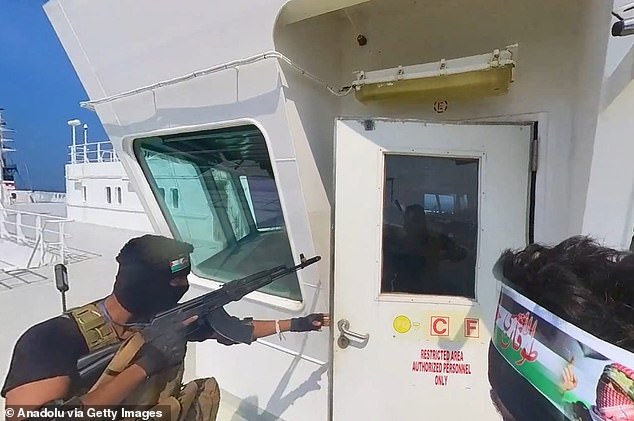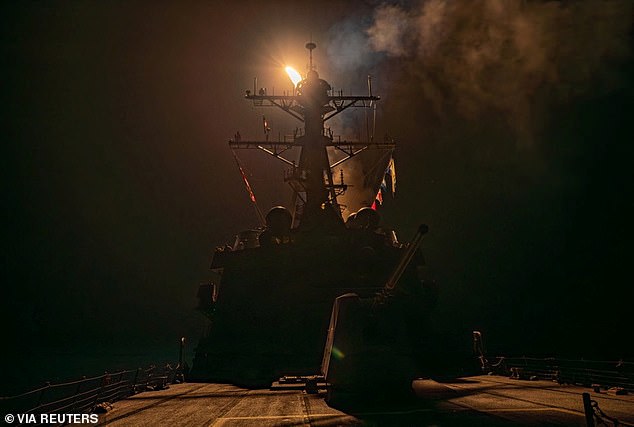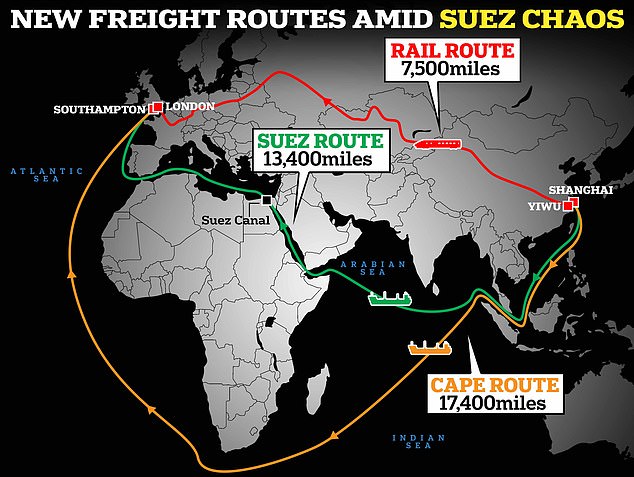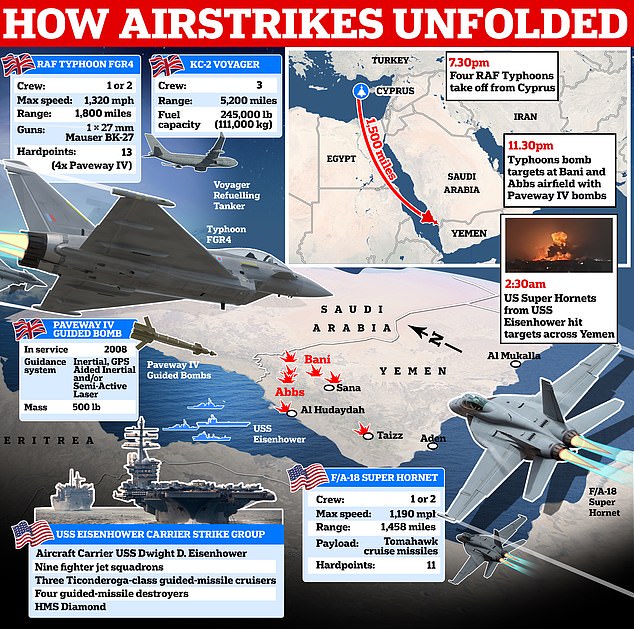Japan’s three biggest shipping lines are the latest to suspend Red Sea routes due to Houthi attacks, risking further price rises for British consumers
Japan’s three major shipping companies said today they are joining other major companies in suspending Red Sea routes due to Houthi rebel attacks on ships in the vital waterway.
The three companies – Nippon Yusen, Kawasaki Kisen Kaisha and Mitsui OSK Lines – said they had suspended navigation through the Red Sea to “ensure the safety of the crews.”
“We have suspended navigation through the Red Sea by all ships we operate,” said a spokesperson for Nippon Yusen, also known as NYK Line.
The three shipping companies are the latest to divert ships from the Red Sea region, traditionally one of the world’s busiest trade routes, in a move that heightens already heightened fears of price rises for British consumers.
Marco Forgione, director general of the Institute of Export & International Trade, told MailOnline that the Red Sea is a ‘vital route’ for Japanese goods heading to Britain. A disruption to that route could impact the manufacturing and auto industries, he said.

Houthi rebels have increased the frequency of their attacks on Western ships in recent months (file image)

A missile is launched from a warship during the US-led coalition operation against military targets in Yemen targeting the Iran-backed Houthi militia on January 12

Freight companies must take alternative routes to avoid the Suez Canal after militant attacks
Forgione said: ‘The Red Sea is a crucial route for Japanese goods going to Britain. So many manufacturing components that are crucial to everyday consumer goods – like the chips in our smart TVs – are imported from Japan.
‘In particular high-quality components and goods for manufacturing and automotive companies. These are supply chains that operate on a ‘just in time’ basis. So if these suspensions continue in the Red Sea, these sectors will be hit hard. Some automakers may even halt production, as Tesla and Volvo announced this week.
‘It is also important to remember that many Japanese manufacturing companies have their European headquarters in Britain. So any delay in the goods coming here will also have a knock-on effect across the continent.
‘All this reinforces why a robust import strategy is so important for Britain, and why the government’s new Critical Imports and Supply Chains Strategy, launched today, is so important.
“Combined with the continued digitalization of trade, this new strategy will help our manufacturers and our supply chains increase resilience at a time of increasing global instability.
‘It is imperative that all companies seek help in reviewing their supply chains. We are moving away from the fragility of the current global supply chain system to one that requires resilience and anti-fragility.”
Since Friday, US and British forces have been bombing dozens of targets in Houthi-controlled Yemen in response to attacks by the rebels, who say they are targeting Israeli-linked ships in the Red Sea in solidarity with Gaza. But in reality, they attack any ship passing through the waterway.
The situation has heightened fears that war between Israel and Hamas could erupt in the region and disrupt trade on one of the world’s most important maritime trade routes.
The waterway between Asian and European markets normally carries about 12 percent of global maritime trade, but since the attacks, shippers have been forced to take more expensive routes that can extend delivery times by weeks.
Ships carrying goods from Japan and other Asian countries to Europe now have to sail around the southern tip of Africa instead of through the Suez Canal, which could increase journey times by a third or more and result in a commensurate increase in fuel consumption and emissions.
For shipping companies, the longer voyages can lead to higher costs for vessel rental, fuel and manpower, and often late fees for consumers who have agreed to deliveries by a certain date.
“Vessels we operate that would soon enter the Red Sea are asked not to enter the Gulf of Aden” south of the Red Sea, a spokeswoman for Mitsui OSK Lines told AFP.
Kawasaki Kisen Kaisha spokesman Goro Kitamura said the company has also suspended navigation to the Red Sea since Friday, but we currently have no ships near the Red Sea.
Last month, Ocean Network Express, a container shipping company jointly founded by the three Japanese companies, said it would avoid the area.
In November, Huthi rebels said they had seized a ship belonging to an Israeli businessman and diverted it to the coast of Yemen.
The ship is operated by Nippon Yusen, who said he has set up a task team to gather information to ensure the safety of the 25-strong crew.
However, as of Wednesday, Nippon Yusen has no new information about the seized ship, the spokesperson said. “We have not received any information while we are concerned about” the fate of the ship and its crew, he said.
More than 350 ships have already been diverted around the Cape of Good Hope, adding ten days to journeys and costing more than $1 million in extra fuel costs.
The attacks have not yet caused prices to rise in Britain, but experts warn that households should brace for further price rises as the conflict causes supply problems and drives up fuel costs.

Britain and the United States bombarded several targets in rebel-held Yemen in a dramatic three-hour period. This image shows what the US-UK coalition used to carry out the attacks, and the timeline of the mission according to official releases
Marco Forgione, director general of the Institute for Export and International Trade, told MailOnline last week that CPI inflation could rise by as much as four percent if the conflict continues or escalates.
This could add 10 cents to the price of a stick of butter, 12 cents to a jar of Marmite and 9 cents to a six-pack of eggs. A pack of 240 Pg Tips tea bags could rise by 19p to £4.98 and a pack of Heinz baked beans by 15p to £3.90.
Tesco chief executive Ken Murphy said: ‘If they (shipping containers) have to go all the way around Africa to reach Europe, this increases shipping times, limits shipping space and drives up shipping costs. That could drive inflation on some items.”
Goods from countries including Bangladesh, Vietnam, Thailand, Japan and Australia will be hardest hit, said Marco Forgione, director general of the Institute of Export and International Trade.
He said: ‘Shoppers can expect shortages in items ranging from clothing, shoes to shellfish, meat and mobile phones, cars, wine and tobacco.’
According to Simon Williams, fuel spokesman at the RAC, fuel prices could also rise by 4 cents per liter in the coming days if tensions in the Middle East escalate further.
A liter of unleaded petrol currently costs an average of £1.40, while diesel costs almost £1.48. If those prices rise to £1.44 and £1.52 respectively, the price to fill a typical 55 liter fuel tank could cost more than £81.
The cost of shipping goods has more than doubled in the past three weeks as freight companies have to deviate from their normal routes via long detours.
Freight prices have skyrocketed since November, rising by more than 300 percent as a result of the disruption.
And those rising shipping costs could have a direct impact on the price of goods sold in Britain.
